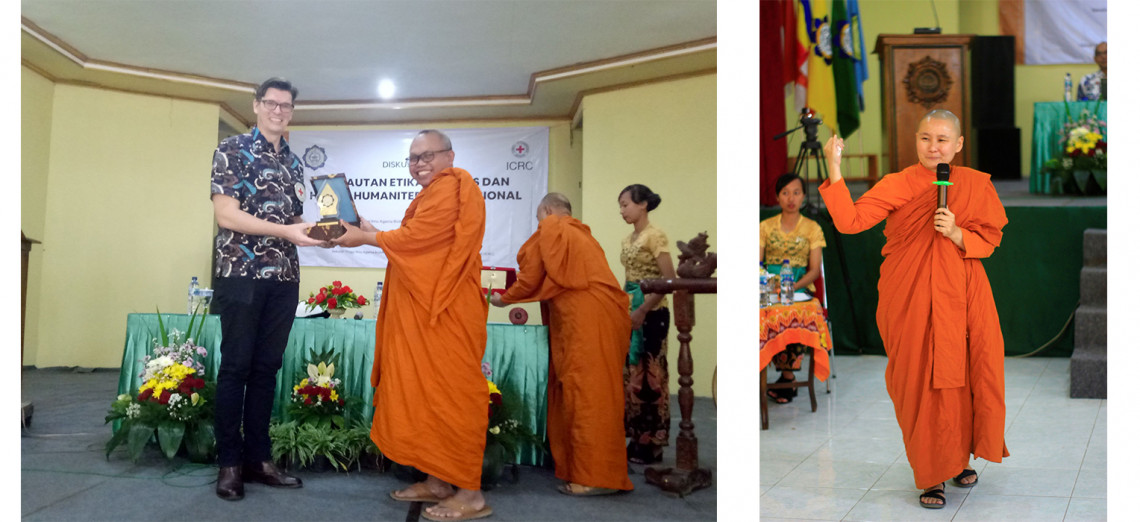On 4 October 2019, the ICRC, in close collaboration with Smaratungga Buddhist College, Boyolali, Indonesia, held a one-day seminar on Buddhist ethics and IHL. Over 100 students participated in the seminar, including 20 novice monks and 26 university lecturers. The seminar followed up on the International Conference on Buddhism and IHL, held by the ICRC in September 2019 in Sri Lanka, where Ven. Thitacarini, a lecturer from the College, presented her research findings.
To open the seminar, Ven. Dr Dittisampano, the Rector of the College, and Charles Dorman-O’Gowan, the ICRC Regional Coordinator for Global Affairs, signed a Memorandum of Understanding on the official collaboration between the two institutions, to promote partnership in areas of humanitarian affairs and the exploration of convergences between Buddhist ethics and IHL.
In his opening remarks, Ven. Dittisampano, who is also the chair of the Association of Buddhist Colleges in Indonesia and the Executive Committee of the International Association of Buddhist Universities (IABU), welcomed the ICRC initiative, “I would encourage our lecturers and students to learn new knowledge of IHL in relation to Buddhist ethics.”
In a similar vein, Mr. Dorman-O’Gowan, while underscoring the shared vision of promoting humanitarian values, said, “It is part of the ICRC’s mandate – and our common vision – to promote humanitarian values in our society as much as possible, since we experience more and more suspicion, division, conflict and even war. Respecting and protecting our common humanity is our shared aim, which we can only achieve together.”
The seminar was divided into three parts. In the first part, Mr. Dorman-O’Gowan introduced the work and the mandate of the ICRC, giving examples from Asia, Africa and the Middle East. Christian Donny Putranto, an ICRC legal adviser, followed with an introduction to IHL using quiz questions and case studies to relate directly to the students.
The second part of the seminar focused on the convergences between Buddhist ethics and IHL, introduced by Ven. Thitacarini. Referring to Attadanda Sutta, Ven. Thitacarini identified specific Buddhist principles that are of direct relevance to armed conflict, such as the absolute prohibition of the use of poison, as well as protection of civilians and the natural world.
Budi Hernawan, from the ICRC Global Affairs team, informed the audience about the dialogue between Buddhist networks in Asia and the ICRC. He explained, “The purpose of the dialogue consists of five elements: to ensure humanitarian access to civilian populations affected by armed conflict; to build partnerships with any stakeholders who have knowledge of Buddhism, and the capacity and network to assist the ICRC in ensuring humanitarian access; to explore the richness of Buddhist traditions in nurturing the common humanitarian values that are at the core of the ICRC’s mandate; to place the ICRC at the mainstream of humanitarian networks in Asia and the Pacific; and finally, the ICRC aims to balance its ongoing engagement with other religious communities.”
The final part of the seminar consisted of a panel discussion, exploring the issue of the protection of civilians during armed conflict. In talk-show format, Ahmad Nashrullah, from the ICRC Global Affairs team, chaired the panel and conversed with the three speakers: Ven. Nyanasuryanadi Mahathera, Surya Rahman, Director of Humanitarian Forum Indonesia, and Mr. Dorman-O’Gowan.
The panelists exchanged their experiences and views on engaging in humanitarian action in different contexts, such as natural disasters and armed conflicts. Ven. Nyanasuryadi highlighted the Buddhist principle of taking action to address the humanitarian needs of people wherever they are encountered.
Rahman shared his experience of engaging in humanitarian action in the Buddhist context of Myanmar. He expressed appreciation of the seminar, saying he feels better equipped now to engage with the Buddhist community in Indonesia.

